Episode #53: The Power of Inclusion: Insights from a Children’s Book Author and Non-Profit Founder
Show Notes: In this episode, Tonya continues her conversation from Episode 52 with Amanda Owen, author of the Owen the Wonderer book series and founder of the non-profit, Puzzle Pieces. Owen is the main character of the children's book series, which includes real people from Amanda's life. The series aims to start conversations about inclusion and acceptance of individuals with disabilities, and each book includes questions for parents and teachers to help facilitate these conversations. Amanda started the series to provide a tool for parents and educators who may not know how to approach the topic of disability with children. The books are based on Amanda's experiences as a special education teacher and the founder of a non-profit organization that advocates for individuals with disabilities. If you missed the first part of this conversation, be sure to listen to Episode 52 to hear Amanda’s story of growing up as the sibling to a brother with a rare genetic condition. She also gives good suggestions on how parents can prepare for their special needs child’s future care. You can watch Episode 52 at https://youtu.be/sapGfxihznY. Since recording this podcast episode, Amanda has launched another project! She created a Gratitude Journal for moms raising children with disabilities. With the help of 30 mommas from across the country, Amanda made something that she wished her mom had 41 years ago when she discovered her brother had a rare disability. This journal is meant to not only help moms find joy in the hard, but also build a village of other moms walking similar paths. You don't have to be alone. This journal will help you connect and find gratitude in your journey raising your child. You can order your Gratitude Journal HERE! ➡ piecesofme.org/gratitude-journal Amanda loves to connect! Find her at: Website: piecesofme.org Podcast: https://podcasts.apple.com/us/podcast/pieces-of-me/id1547078857 Facebook: https://www.facebook.com/piecesofmebyamanda Instagram: https://www.instagram.com/piecesofmebyamanda/ Connect with Us: https://linktr.ee/waterprairie Support this channel: https://www.buymeacoffee.com/waterprairie “2 Truths and a Lie” Game: Can you guess which statements Amanda shared were her truths and which was her lie? Post your best guess in the comments below. We’ll post the correct answer on Instagram next week so be sure to check and see if you were right. 1. Her brother was the 11th person in U.S. with his diagnosis. 2. She is 2 episodes from 100th on podcast. 3. She loves to cook and try new recipes. Music Used: “LazyDay” by Audionautix is licensed under a Creative Commons Attribution 4.0 license. https://creativecommons.org/licenses/by/4.0/ Artist: http://audionautix.com/
The Water Prairie Chronicles Podcast airs new episodes every Friday at Noon EST!
Find the full directory at waterprairie.com/listen.
Strategies for Inclusion
Show Notes:
In this episode, Tonya continues her conversation from Episode 52 with Amanda Owen, author of the Owen the Wonderer book series and founder of the non-profit, Puzzle Pieces. Owen is the main character of the children’s book series, which includes real people from Amanda’s life. The series aims to start conversations about inclusion and acceptance of individuals with disabilities, and each book includes questions for parents and teachers to help facilitate these conversations. Amanda started the series to provide a tool for parents and educators who may not know how to approach the topic of disability with children. The books are based on Amanda’s experiences as a special education teacher and the founder of a non-profit organization that advocates for individuals with disabilities.
If you missed the first part of this conversation, be sure to listen to Episode 52 to hear Amanda’s story of growing up as the sibling to a brother with a rare genetic condition. She also gives good suggestions on how parents can prepare for their special needs child’s future care. You can watch Episode 52 at https://youtu.be/sapGfxihznY.
Since recording this podcast episode, Amanda has launched another project! She created a Gratitude Journal for moms raising children with disabilities. With the help of 30 mommas from across the country, Amanda made something that she wished her mom had 41 years ago when she discovered her brother had a rare disability.
This journal is meant to not only help moms find joy in the hard, but also build a village of other moms walking similar paths. You don’t have to be alone. This journal will help you connect and find gratitude in your journey raising your child.
You can order your Gratitude Journal HERE! ➡ piecesofme.org/gratitude-journal
Amanda loves to connect! Find her at:
Website: piecesofme.org
Podcast: https://podcasts.apple.com/us/podcast/pieces-of-me/id1547078857
Facebook: https://www.facebook.com/piecesofmebyamanda
Instagram: https://www.instagram.com/piecesofmebyamanda/
Connect with Us: https://linktr.ee/waterprairie
Support this channel: https://www.buymeacoffee.com/waterprairie
Music Used: “LazyDay” by Audionautix is licensed under a Creative Commons Attribution 4.0 license. https://creativecommons.org/licenses/by/4.0/ Artist: http://audionautix.com/
Meet Today’s Guest:
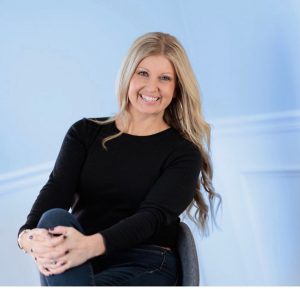 Amanda Owen is an accomplished children’s book author, blogger, podcaster, and nonprofit founder/director. She is a lifelong advocate for people with disabilities, inspired by her older brother Nick. Amanda is dedicated to empowering women to find their purpose and lead fulfilling lives, free from societal expectations. She and her husband, Justin, have two sons. Amanda’s inspiring message is to dream big, work hard, own your mistakes, and laugh often.
Amanda Owen is an accomplished children’s book author, blogger, podcaster, and nonprofit founder/director. She is a lifelong advocate for people with disabilities, inspired by her older brother Nick. Amanda is dedicated to empowering women to find their purpose and lead fulfilling lives, free from societal expectations. She and her husband, Justin, have two sons. Amanda’s inspiring message is to dream big, work hard, own your mistakes, and laugh often.
Episode #53: The Power of Inclusion
Insights from a Children’s Book Author and Non-Profit Founder
(Recorded February 22, 2023)
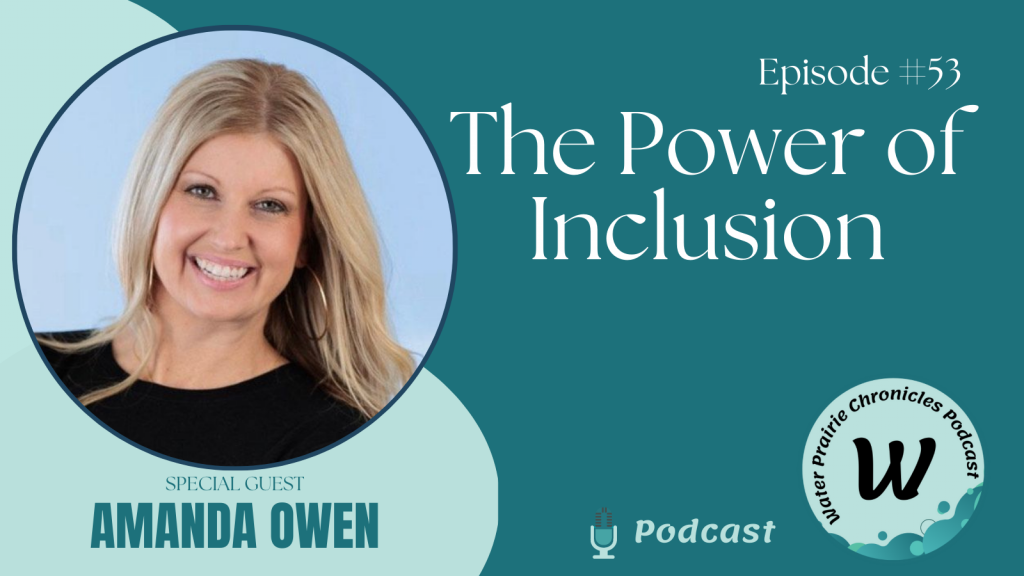
Yeah. Well, switching gears here. You have two books, three books out, in the Owen, the Wonderer books? How many are out now?
We have two books. Two. It’s a series of two. Mm-hmm. Now we have future books that will come. We want that to be a series. Well, it is a series cuz it’s two already.
I say it’s two. It’s two. We can officially call it a series at two. Yes. So, tell us a little about, about who Owen is and why he’s the one. And this is, those who are listeners, you can’t see this written, but it’s Wonderer. “W-O-N-D.”. Not “W-A-N-D.” So, he is not out wandering around. Maybe he is, but. So tell, tell us about Owen and how he came into being.
So, Owen is named after, obviously my last name, so that’s the main character. A lot of all the characters in the children’s book, are, are real people in my life. and so growing up, and being the advocate and the sister I was, what I always say, I say this all the time as an advocate, I say, when we know better, we do better.
"When we know better, we do better." – Amanda Owen Share on XIt’s not that people intentionally are trying not to include or accept or understand. They’re just too darn scared to ask the questions of the fear of doing it wrong, or they don’t know what they don’t know. And so, you know, I was always the kid in the class, you know, that people would ask, I was never offended if they asked because I wanted them to ask.
So, I’ll tell ’em how to think. So like, I guess I still do that today, but had I wanted you, I wanted people to feel, for me, to make people feel comfortable enough to, as long as you’re asking in a respectful way, I’ll tell you anything you wanna know. and so that’s kind of what kind of came out of the wonder, like Owen the Wonderer.
You know, why does this, you know, why does she have Down Syndrome? You know, why does she throw a fit in class? You know, why is she non-verbal? Why does she use the augmentative device? I was, when I was a special education teacher, it was my first non-profit I ever started. It’s actually in the second book.
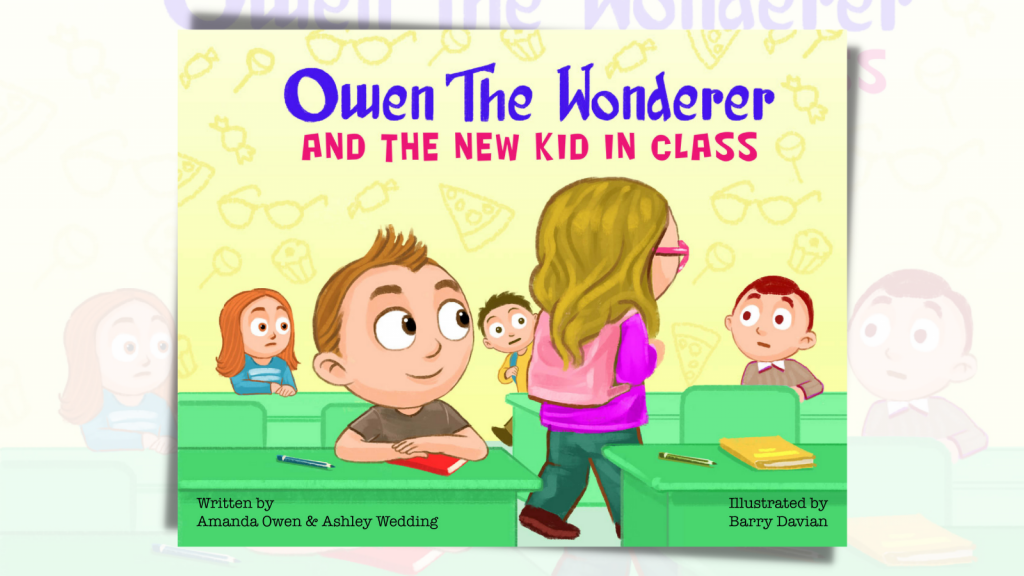
So the first book is about an individual with Down Syndrome that’s new to the class. Okay? The second book, is centered around, her name is Karlie. she happens to have cerebral palsy. She’s real in my life. and she’s the, the first, the reason for the first nonprofit I ever started and I was a school teacher and, there was, her name was Lauren Tucker, she’s in the book as well, and Lauren was in eighth grade.
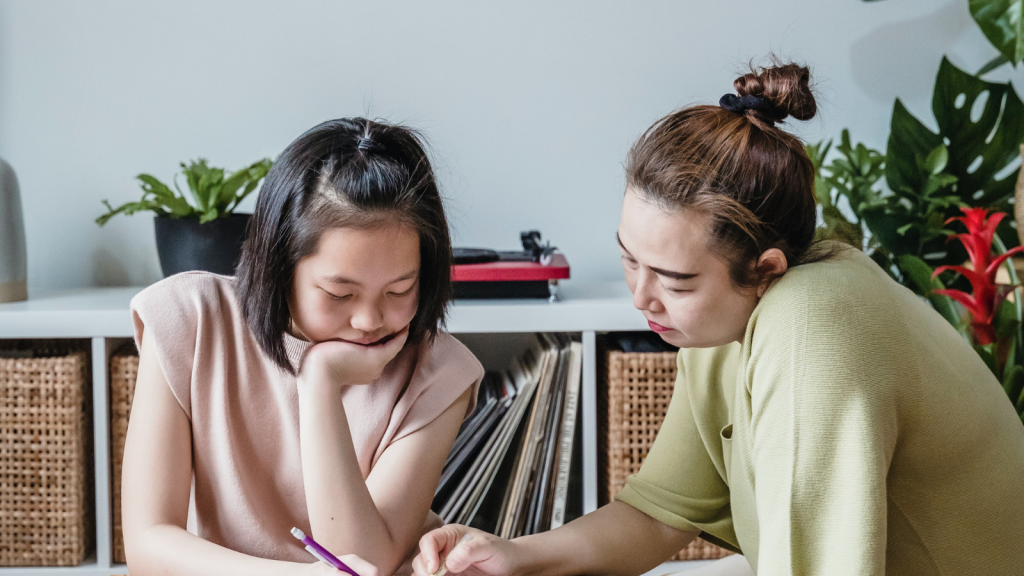
I started the first, here, in my hometown. I started the first peer tutoring class. I was a middle school teacher, so I started the first peer tutoring official that people could use like eighth grade, seventh and eighth grade students could use as an elective. Instead of going to PE they could go to peer tutoring.
And so they were being buddies in my classroom and one of their names was Lauren Tucker. She was in my first peer tutoring class and she was with Karlie, and we were watching, uh, I did a lot of crazy things as a teacher. So, we were watching Oprah Winfrey, and we were watching, Team Hoyt. I don’t know if you’re familiar with Team Hoyt, but it was a father and son duo and they competed in they’re since retired, but they’ve competed in, he has cerebral palsy, and his dad pushed him in like 5Ks and triathlons and, Iron Men’s and all of these things. Well, Lauren Tucker was an eighth grade student in my class, and so she was watching with Karlie and she turned to me and she said, I wanna do this with Karlie. And Karlie was like pointing to the, she’s non-verbal and she was pointing to the screen and pointing to herself.
Okay, let’s do it. But what happened is Lauren, she asked me one, she stayed after class and she said, why does Karlie drool? And so, I told her why she drools. Like why she wears the handkerchief, why like, and the next day what I saw was, and I’m gonna try not to cry, but what the next, I tell the story all the time.
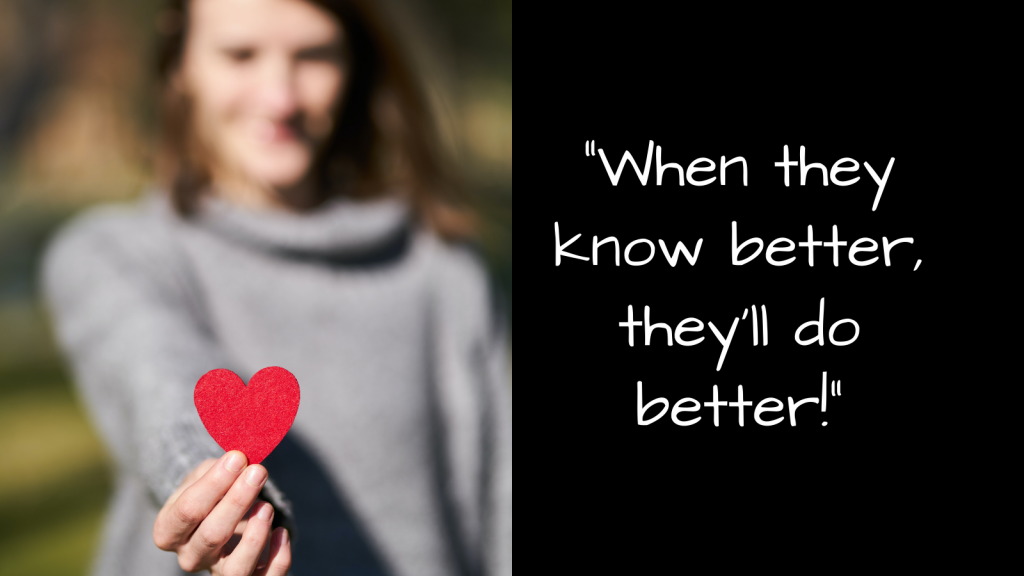
The next day I saw an eighth grade girl who saw Karlie start to drool. and took her own bare hand wiped the drool from Karlie’s mouth. And in that moment I realized that our youth, when they know better, when they know they’ll do better, right? So once she could, she understood about why she did, like, why she drooled or in that she can’t help that.
Then she was able to do what she needed to do to support her friend and that is magical to me. Actually, Lauren is still in Karlie’s life. It’s actually in the book, but so the children’s series in, in a long story. I think those monumental things that have happened in my life of just being the educator, being this to like, I don’t think intentionally kids want.
Now there are some bullies la I mean, let’s just be honest, but like intentionally trying to isolate or exclude, they just don’t know how. And I wanted to provide a book to start the conversation of how to include, how to embrace, how to educate in a way that a k a kid can understand it. And here’s the other cool part that the all the books do is there’s questions for the parents and teachers in the back of the book.
Nice.
That allows a parent, because I see so many times parents be like, oh, don’t stare. Oh, no, no, no, no. Like, don’t ask me that. I don’t know. You know, like we shut down cuz we don’t know. We’re awkward as you know. I, because we were never told, and maybe we’ve never been around somebody with a disability, and so parents don’t know the tools and so then, that kid is learning, oh, well they’re different than me.
Oh, like I shouldn’t be talking about them. Or, oh, I shouldn’t be staring. Right? So then they naturally subconsciously have this fear around it because they’re just, because their parents telling them not to stare or we don’t talk about it. We don’t, I don’t know the answer to that. So, the book allows that conversation to happen naturally, and gives you the tools to be able to say, what would you do or how would you do? And so like, hopefully that we’re learning from our kids because they’re, they’re resilient. They’re amazing. Kids are amazing. So yeah, it was some of the proceeds, 25% of the proceeds of every book sold goes back to my non-profit.
So yeah, I get to create awareness and advocacy, and we’re gonna continue with the series. The next one will be about autism. The next one will be about something else. We’ve got two books out now and we’re rolling with that and trying to manage, but it’s, It also gives, like McKenzie, who happens to have Down Syndrome in the first book, it gave her the ability to go to the schools with me and sign the books and get all the attention. And same for Karlie. so yeah, it’s just been a really cool, that’s, that’s where the book came from. That’s why we do what we do.
Do you use their names in the books or are they a different name in the character?
It is them. And what we did with the illustrations,, one of the cool things is, is we actually sent the picture of like McKenzie to the illustrator and we worked with a, he’s not from here. And so, we worked with the illustrator of, of really trying to capture the true detail behind each individual. Right. And so that was even more trickier, you know, The wheelchair, like let’s say for Karlie, and this is so important because the wheelchair is part of Karlie, like a person that uses a wheelchair.
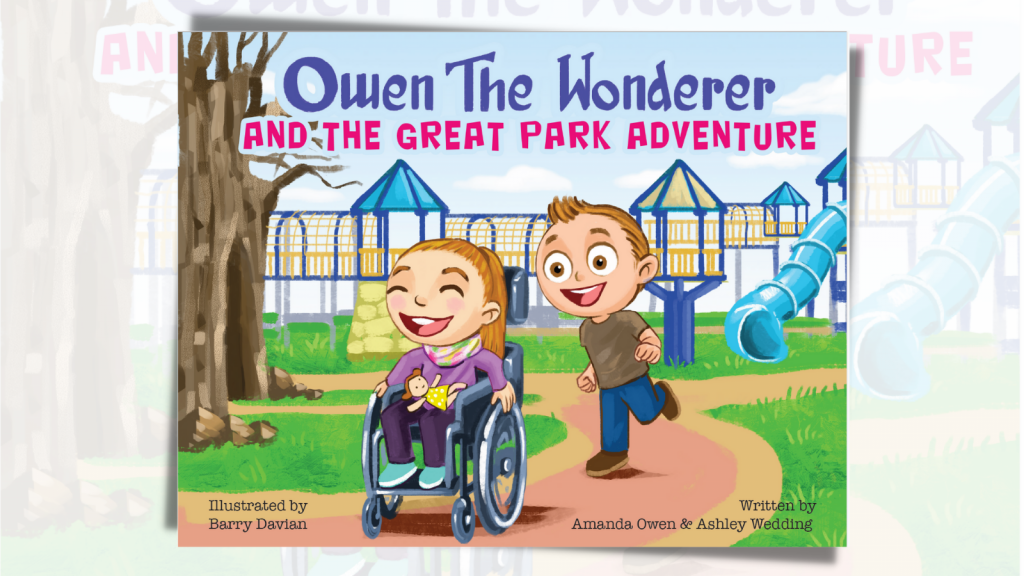
It’s their body, it’s part of them. And so, you know, when he first sketched, the wheelchair was like a, a, a transport wheelchair that you would see in a hospital. And I’m like, no, that’s not her wheelchair. Like, we need to get it right. You know? Like the headrest. And she has these flaps, like her name needs to be on it, so, because it it’s her, it’s her identity. So that was, yeah, they’re, they’re them in the book.
I was, I was wondering how you had gotten the illustrator to make sure it was represented right. I like that because a lot of times you do see just that, ambulatory type wheelchair that you see in the hospital when you, when you go into the door, the first, the front of a church or something if you’re going somewhere.
But that isn’t what most kids are using whenever it’s custom made for them. All right, so you talked about the, the back of the book. So, there’s questions for educators and for parents, both.
Mm-hmm. Yep.
And are they just like bringing up conversations?
Yeah, so they’re like, post questions, guided questions to kind of start that conversation with them.
And we also have lesson plans that we’ve designed around each of the books. Well, the lesson plans haven’t come out from the second book. but for the first book, we already have lesson plans and so, yeah, uh, we, we. There’s lesson plans, there’s worksheets.
Nice.
It’s just to start the conversation because again, when we know better, we do better.
And so we just want families, and this is really not, that’s the crazy part. This book is not a book for the special needs family. Right? It’s not. I mean, it can be, but it’s really for, to understand. It’s the perspective and I haven’t seen this a lot, but like our book is from the perspective of the neurotypical student individual that is trying to learn and understand, has the real questions of how to navigate, and shows him having conflicts like for example, in the second book.
And without giving away too much, but I mean, I’m not giving away anything but in the second book, it’s, they’re on, uh, a playground that’s actually mirrored after Owensboro, Kentucky’s playground that we’re known for. They’re on the playground and his friends from school come, and he’s playing with Karlie and they wanna go down the slide.
Well, obviously the, the playground is not wheelchair accessible. Karlie can’t go down the slide. So, he has the internal conflict of, how do I include her? That I really wanna go with my friends, but I don’t wanna hurt her feelings, so how do I include her? And so he works through that to figure out what that looks like to it makes kids hopefully think. There is another solution, there’s a way we can include, you just gotta be creative around that.
Right. so yeah, that, that’s, that’s the books
You had, you had talked about how, parents are telling kids, you know, not, not, not to stare not to ask questions. My daughter talks about that, that, if she has her cane out, she’ll notice that kids a lot of times are just kind of looking and she’ll see the parents pull them aside and she’s like, you know, just ask.
It’s. It’s not, it’s not rude to ask a question, what’s rude is to point and stare and to, to walk away without ever engaging. And, and so, and for her, because she has low vision, she’s able to see them walking away from her and she’s like, you know. Hi, I’m over here. I can, I, I can explain it all to you, but I actually, but I do think it’s, yeah, it was a, it’s, it’s, it’s a case where, you know, it’s, it’s, it’s a misguided way of treating it where they, they, they feel like they’re doing the right thing by not being rude, but it comes across the other way.
A hundred percent.
So I, I cut you off when you were saying something too.
Oh, no, I actually did a, uh, I think a, a column, I write a column, but like a column. It was either a column, a blog or a podcast episode.
I don’t know. They all blend together, but it was like, I welcome you to stare, like I will teach. This is what I want. If you’re gonna stare, or this is what I want you to do after you start to stare. And so, because I think that we naturally, if you’re talking about the disability community, we. We don’t want the stares to be a stare of judgment, but if you’re gonna stare, then let it make it count and this is what we want you to do with it.
Right? So, I kind of walk through that in some something I do,
I like the perspective of that. So you do have a title that you’re working on now, or it’s the next one that you will be working on autism.
We don’t have a title, obviously it’ll be Owen the Wonderer. We don’t have the title yet.
Okay. We have some concepts we’re throwing around, but autism’s gonna be our most biggest challenge just because there’s a wide spectrum and Yes. so we’re trying to be very creative in one book. How do we capture that? So, yeah, it ought, we’re up for the challenge, but we’re just gonna, we’re kind of riding the wave right now and celebrating, cuz we just came out with our second book and we’re working on another project right now, and I don’t know when this will air, but we’re announcing it March the first. Okay. Of what that project will be, but it’ll be a lot for special needs mamas,
Oh, good. That’s good. So, we’ll, again, we’re linking your, your contact information. So those are listening March 1st, check. Yeah, check to see, see what it is,
And, where can our listeners purchase your books?
So they can go to piecesofme.org, which is my website, where they can access a lot of the things that I do there. So, it could be there. And if they follow me on Instagram, which is @piecesofmebyAmanda in the link, there’s a direct link that you can buy on there as well.
Okay, great. Great. All right, so that’s Pieces of Me by Amanda. Tell me about Puzzle Pieces.

Oh, Puzzle Pieces. So my elevator pitch for puzzle pieces, we are what started out 10 years ago to being, I, I just wanted a transitional place for adults and for kids after school of what my brother didn’t have after he graduated high school.
He really exhibited a lot of behaviors. He was missing what school brought to him. The social, like it was the only school was the only thing that was outside of my family. My family didn’t know what happened at school kind of. Right. It was his thing. And so, and then I went off to college and then it was just bad for my brother.
And so, I didn’t, I realized as being a middle school teacher, I start having these conversations with these parents of what does life look like after high school? And there wasn’t a lot of options. Jobs were limited at that time, you know, there wasn’t no options, it was jobs, you know, post-secondary education.
Now that’s getting a lot better with certificate programs within colleges. Like we’re in a different state even now than we were 10 years ago. So I just wanted a place, like a social place that people like my brother that had a variety of different, different disabilities. When they graduated, they had a place to like meet up and be kind of a community center and go out to lunch or go to bowling or do the things that they wanted to do, but also work towards skills.
So, because if they don’t work for ’em, they’ll lose it and it’s not generalized. So I just kind of wanted that, well that was 10 years ago. We started off with that 32 clients. It was just gonna be a social place. That was the goal, at seven staff and now 10 years later we serve, I think we’re up to 430 individuals that we support
Wow.
With disabilities. we have employment. We’ve placed 69 individuals with disabilities into the workforce. Yes, we have a huge division within that. We do long-term living care. We have several houses. We have an Owen Autism Center. It’s named after me unfortunately, but we, uh, support, our youngest is 18 months of age.
Our oldest, oldest is 21 in our Owen Autism Center. so we do a lot of ABA therapy. We do a lot of, summer school after school for those just with autism. We partner with the schools, we work with the teachers and the therapists to really just be the centerpiece, no pun intended with piece of Puzzle Pieces, but like the centerpiece that kind of really allows us to connect. Right?
Like school doesn’t just have to be school therapy does, it doesn’t have to be therapy, but like how do we group it together to be one big., to, to let it build on one another. So, and then yeah, then we have day training programs. I’m sure we have something else that I’m not thinking of, but, so yeah, we now operate, uh, it’s 4.6 million, our vision to expand.
Wow.
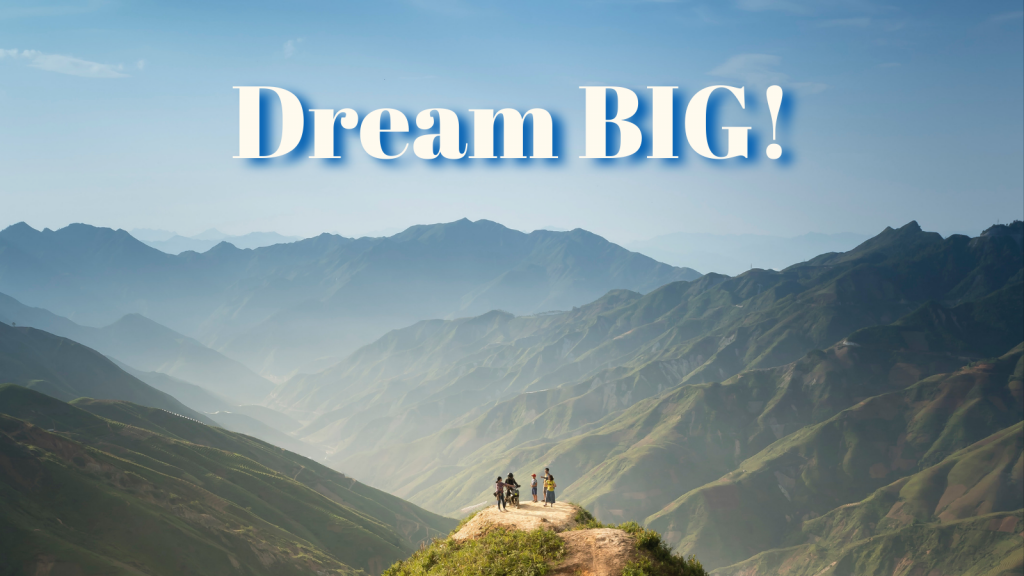
And this upcoming year, we will probably double that. I have over a hundred. So all of this, just because I had a dream of supporting and providing opportunities for those with disabilities has led into really, being a trailblazer here in my community of really looking at the unique services.
It doesn’t have to be, we should have a buffet, right? Like it shouldn’t, we’re not a fit for everybody. I’m not saying everybody with a disability in Owensboro comes to us, like we try to work ourself out of a job, but it should be a person with a disability just like. 20 different gyms out there probably in one hometown.Right?
Right.
Like there’s in, in a, a way, like in a 20 mile radius, there’s probably 20 gyms because every gym has something to offer that maybe builds their community or that they like about that environment versus another. We have the opportunity, have a lot of different buffet of opportunities to select people with disabilities do not.
So that’s what we try to do, is provide an opportunity of array of things of it. It’s not cookie cutter. We’re not providing a service that they have to come to us and fit into that service. Our service and our supports really fit into their lifestyle.
If our listeners have any questions after listening to this, what’s the best way for them to get in touch with you?
You can again, uh, track me on to our website, which is piecesofme.org. That’s like my personal platform, which would be directly towards me and all of the other things that I do. Now, there is, if you’re interested in learning more about Puzzle Pieces, we do have a website as well. It’s puzzle-pieces.org.
Maybe one day I do plan to franchise that and maybe it’ll be in a town near you.
Oh, cool.
So, we do have a Facebook page and an Instagram page for Puzzle Pieces, @puzzlepiecesky, and then the best platform for me that I typically stay on and, and, you know, build a community around, it’s Instagram and that is @piecesofmebyamanda and yeah, I’m always there. So.
Excellent. Excellent. And she, she has some, some really interesting stuff that, that she’s posting on it, on Instagram. So Amanda, thank you for taking some time to go through all these variety of questions here with us today.
I’ve really enjoyed getting to know you a little bit and hearing a lot about what you, what you’re doing here. So thank you for sharing your expertise with us.
Thank you for having me. This is awesome. I appreciate your time.
